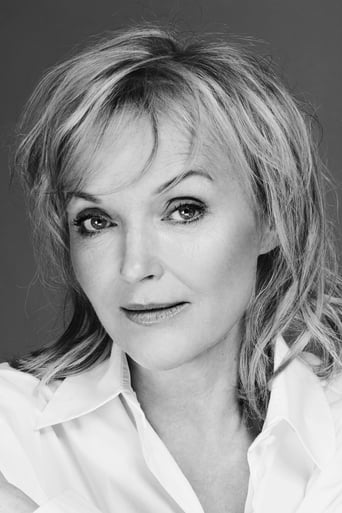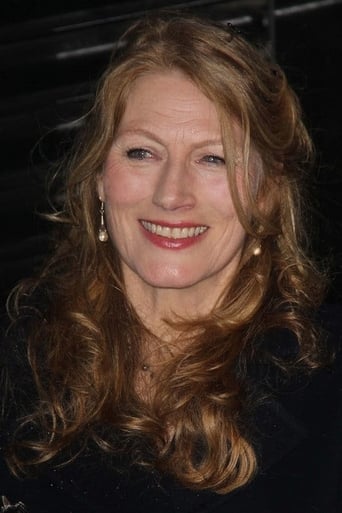Phonearl
Good start, but then it gets ruined
Fairaher
The film makes a home in your brain and the only cure is to see it again.
Mathilde the Guild
Although I seem to have had higher expectations than I thought, the movie is super entertaining.
Caryl
It is a whirlwind of delight --- attractive actors, stunning couture, spectacular sets and outrageous parties. It's a feast for the eyes. But what really makes this dramedy work is the acting.
jc-osms
Ignore the dull title and settle down for a feel-good movie movie which dramatises the historic equal-pay struggle of the woman-workers at Ford's Dagenham car-assembly plant in 1968.Yes, it's deliberately sexed-up and you can see a stage-musical bursting to get out a la "Billy Elliott", "The Full Monty" et al (one is in production) but the underlying story is still purveyed with a winning mixture of pathos and good humour. The era is effectively conveyed with the fashion, domestic interiors and of course cars of the day to appeal to the nostalgia freaks in all of us and if the sixties' soundtrack is occasionally eclectic ("Green Tambourine" by the Lemon Pipers?), it does at least start with the apt Desmond Dekker song "Israelites" (opening line "Get up every morning, slaving for breakfast") and ends in triumph with another reggae classic "You Can Get It If You Really Want" by Jimmy Cliff.Directed by "Calendar Girls" Nigel Cole, the story does "go Hollywood" a little too obviously at times, with its creation of the two main trade union women representatives at the heart of the protest, Sally Hawkins initially reluctant but miraculously eloquent and feisty mother- of-two Rita O'Grady and Geraldine James as the older Connie with her own back-story of being married to a stuffy, emotionally-damaged and dependant war veteran, played by the recently deceased Roger Lloyd-Pack. Apparently in real-life, the women didn't "strip down" in the heat at the factory or wear hot-pants as one of the younger ones does but these are obviously inserted for humour and I suppose mild titillation. Rita's own relationship with her initially supportive husband comes under strain as the strike hits them financially but of course he comes round in the end, while Gloria's situation with her ailing husband takes a dramatic, perhaps overly-dramatic turn for the worse too. I wasn't completely convinced either by Rita's bonding with the posh wife of one of the Ford officials but at least it opened the story out with its inference that sexual discrimination is classless.By the time we get to the grandstand finish when the women convince Labour's high- profile Employment Cabinet Minister, Barbara Castle to announce their victory outside Parliament to triumphant background music, while obviously milked to some extent, it's impossible not to cheer for their success.There are some good acting performances, especially Hawkins as Britain's answer to Norma Rae, Miranda Richardson as self-proclaimed fiery redhead MP Castle and Bob Hoskins as a sympathetic veteran male union rep. There's a great story to be told here, this being the first ever time that the equal rights for women taboo was broken in employment history and I probably would have preferred a more serious, true-to-life approach but watch the film to be educated and entertained, if not quite in equal measure.
lasttimeisaw
Sally Hawkins' Golden Globe winning in 2009 for HAPPY-GO-LUCKY (2008) prompts herself to the eminent status as a new rising star from UK, so two years later, she acquired another hard- earned leading role in this Nigel Cole (CALENDAR GIRLS 2003, a 7/10) helmed biographic story of women's fighting for equal rights (equal pay). It is rather hard to believe that merely half-a-century ago, equal pay would induce such a startling pain-in-the-neck in UK, the most advanced and civilised country in the world, which should have been taken for granted by anyone anywhere now without a second thought. So each and every little progress in the human history needs tremendous effort to push behind it, and gladly this film is able to manage a solid job to portray such an effort with a strongly female- skewed cast. Hawkins has an ardent inner power within her willowy body, the most intense scene is the explosive encounter between her and her husband (Daniel Mays), when she shoots back with the punchline "It is what it should be!", definitely a soul-lifting achievement just by one single line and her current ranking is among my top 5 in the leading actress category. Then comes to the supporting group, Oscar-nominees Hoskins and Richardson are both fine, but unfortunately no scene-stealing moment; otherwise veteran Geraldine James and the former Bond-girl Rosamund Pike are the lucky ones here, the former is compellingly amiable even in her saddest time, while the latter deftly utilising her very meagre screen time to declare her faculty in transform some average shots into her personal proscenium (she is among my top 10 supporting actress list). The film may not be an idiosyncratic piece of work which should have infusing new blood into the heartening but vaguely worn-out biography breed, and more or less, its narrative strategy is too formal and a trifle conservative, but it has its flair in instilling a feel-good assurance to its audience without being dictatorial and sermonic, plus an adroit engineering of its source material into its maximum momentum, and last not the least, a laudable UK troupe is the key of it.
Tim Kidner
I had many friends who enjoyed this film immensely. Almost, there's nothing TO dislike, but that most definitely does not mean that it's frothy nonsense. Or, indeed, politically correct, or, as far as Everyday Joe can tell a huge distortion of the truth.I didn't see it until it got to Sky Movies and whilst it isn't film of the year, neither is it at all bad. Take a sure-fire recipe: an unenviable and untenable situation, definitely preferably a real-life one, throw in some believable and plucky characters and give them an underdog mission to accomplish against insurmountable odds and you have it, simple ingredients to make a nourishing and satisfying movie.True, it didn't reach the dizzy heights of popularity as the likes of The King's Speech, but the source material was, shall we say, a little less Royal! and didn't have the sheer cheeky bravado as The Full Monty. The quest for better pay for the women Ford workers, who actually had their job as seamstresses making seats for Ford's popular cars, downgraded, to that of unskilled. In the wake of a strike-riddled Britain, families had absolutely no leeway with their household budgets. Therefore, they cannot afford to strike.Bob Hoskins as the foreman is perfect and how he sees their side and the potential in Rita (Sally Hawkins) an unpretentious mother and wife, who says as she sees. Miranda Richardson is also well cast as the newly appointed Cabinet Minister who is their target for change and John Sessions makes for a very authentic (especially sounding) PM Harold Wison. We see actual footage, sort of pretending to be 'current' of the production lines and meetings in Ford's HQ in Detroit (if I recall).There are a few domestic scenes that, for me at least, aren't as interesting but otherwise it's sassy and smart with just the right amount of comedy and pathos. The group of women (that include Geraldine James and daughter of Ray, Jaime Winstone) are like sisters who rally around both their new-found cause and each other's plight and like the women in The Calendar Girls, we are with them all the way, cheering at their successes and feeling for them at their setbacks, something I'm sure that stretches across all political persuasions.If you haven't yet seen Made in Dagenham, I suggest you do. There is some swearing but no more than in normal heated argument and mild, clothed sex scene/s and so is suitable for most age groups and every social segment.
Robert J. Maxwell
Two of the performances I enjoyed most were those of the men who were flunkies for some woman who is high up on the bureaucratic food chain. She's a self-described "fiery redhead" and is on the side of the women machinists who are striking for equal pay at a Ford plant in England. As she dresses down the undersecretaries -- Kloska and Jupp, maybe -- they squirm and flinch, their eyes bulge, and they manifest all the outward signs of discomfort. And they're great at it, gulping and glancing at one another with their mouths agape.Then there's Sally Hawkins as Rita O'Grady. All the performances are good but she's outstanding. She's petite and frail but when she smiles or gawks at something we notice a determined set of choppers. She's not a demanding fire eater either. She's chosen as de facto leader of the strike by Bob Hoskins, who bypasses the nominal head of the union because he senses a winner in Hawkins. And she is a winner. She makes few heady speeches but is quietly effective. At their first meeting, the high-echelon politician asks what it would take to satisfy Hawkins. How much more pay would they settle for, short of equal pay with men. "Seventy-five percent?" There is a long nervous pause and Hawkins pipes up in her thin girlish voice, "Ninety percent?" After looking at the summary I was genuinely worried about this movie. Is it going to be another celebration of feminism in which all the men are stupid chauvinistic brutes and the women confused, beaten, defiant, ultimately victorious? Nope. It's more subtle than that, more like "Norma Rae" with less domestic drama. There's only one stupid line of dialog. A reporter asks the women how they will "cope" without pay during the strike. Hawkins replies with anger, "COPE? We're WOMEN." Imagine a reporter asking that of male workers on strike and some guy replies, "COPE? We're MEN!" I know nothing of British labor history so I was a little confused about who was who and, never having heard of this incident, didn't know whether it was fictional or historical. When Harold Wilson showed up, I concluded the event had been real rather than dreamed up.The husbands are presented as maybe a little weak but generally supportive of the women's strike. One of the husbands, mentally disturbed, hangs himself. I'm so glad this wasn't a case of "sleeping with the enemy." Is there a villain? Of course. There must always be a villain in any story of conflict, and this movie isn't sophisticated enough to humanize him. He's a kind of liaison with Ford's plants in England. He carries on about the need to make a profit and threatens to move his plants to another country and put tens of thousands of Brits out of work if the strike isn't broken. He doesn't mind unions as long as they're powerless. I can't help wondering if the Yanks don't have people running for president today who carry the same Neanderthal values in their bones. (Sorry.) The women machinists wind up with more than they had bargained for -- 92%, in fact, and a law mandating equal pay was passed a few years later. Progress is made in incremental steps.






